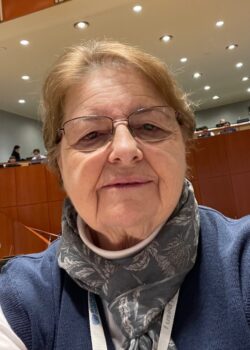January, 2024 Monthly Reflection
January 1, 2024January 2024 is National Slavery and Human Trafficking Prevention Month, as decreed by presidential proclamation.
Sister Michelle Loisel, DC
While we like to think of slavery as a relic of the past, we know that it is not. Today, it looks different and is often referred to as modern-day slavery or human trafficking. While slavery of the past was legal and targeted a specific race, human trafficking is illegal in every country around the world and impacts all ethnicities.
Millions of women, men, and children are subjected to forced labor, domestic servitude, or the sex trade at the hands of human traffickers. What many do not realize is that this crime occurs right here in the United States, in our own cities and towns.
Many people still do not know what trafficking is, or do not care. I have found over the years that one of the biggest impediments to anti-trafficking efforts is a lack of understanding of the issue. Trafficking, and consequently, the measures taken to combat it, is often entangled with people smuggling, immigration and asylum, prostitution, and other forms of organized crime. It must be emphasized that the essence of trafficking is the forced exploitation of individuals by those in the position to exert power over them.
Two main factors drive the spread of human trafficking: high profits and low risk. Like drug and arms trafficking, human trafficking is a market-driven criminal industry based on the principles of supply and demand.
Every year, traffickers generate more than $150 billion in profits by victimizing millions of people worldwide.
If we really want to stop this scourge, then prevent it from happening in the beginning. We know the social constructs that have been put in place to make people more vulnerable— the social inequalities, the health disparities, poverty, homelessness, migration, children, the lack of quality education, violence, racism. People susceptible to manipulation are prime targets of this lucrative and criminal industry.
Digital environments are playing an increasingly central role in the lives of children and adults. During and after the pandemic, many children are now both socializing and learning even more online. This has provided many opportunities, but it can heighten risks to children, which can be scary for parents and other caregivers alike.
We have at our fingertips several safety tips to keep in mind while surfing the web and using social media. Blue Campaign has the following: https://www.dhs.gov/blue-campaign/online-safety
In keeping children safe online, prevention is vital. We know that child sexual abuse and exploitation can be a challenging and sensitive topic to discuss with children, but it can be a vital step in keeping children safe. The National Center on Sexual Exploitation found that online grooming can occur on virtually any major interactive platform, including online gaming and social media. One study found that children could become victims of online grooming in as little as 17 minutes (Lorenzo-Dus, Kinzel, Di Cristofaro, 2020).
Consequently, to protect young people from becoming victims of human trafficking, ensure that the children have supportive, loving, caring adults in their lives and a safe place to sleep at night.
Prevention strategies include strengthening and creating healthy relationships, reducing risks within the individual’s environment, and increasing barriers to violence.
Key to any trafficking preventative response is the need to consult with and listen to the experiences of formerly trafficked people. These individuals have the expertise and experience that no theoretical analysis can provide. Addressing trafficking as a violation of human rights not only requires prosecution of criminals and protection of human rights, but also demands responses that respect and recognize that survivors have an essential and active role to play in the work of prevention.

Sister Michelle Loisel, DC
Category: Monthly Reflections, The Alliance to End Human Trafficking

